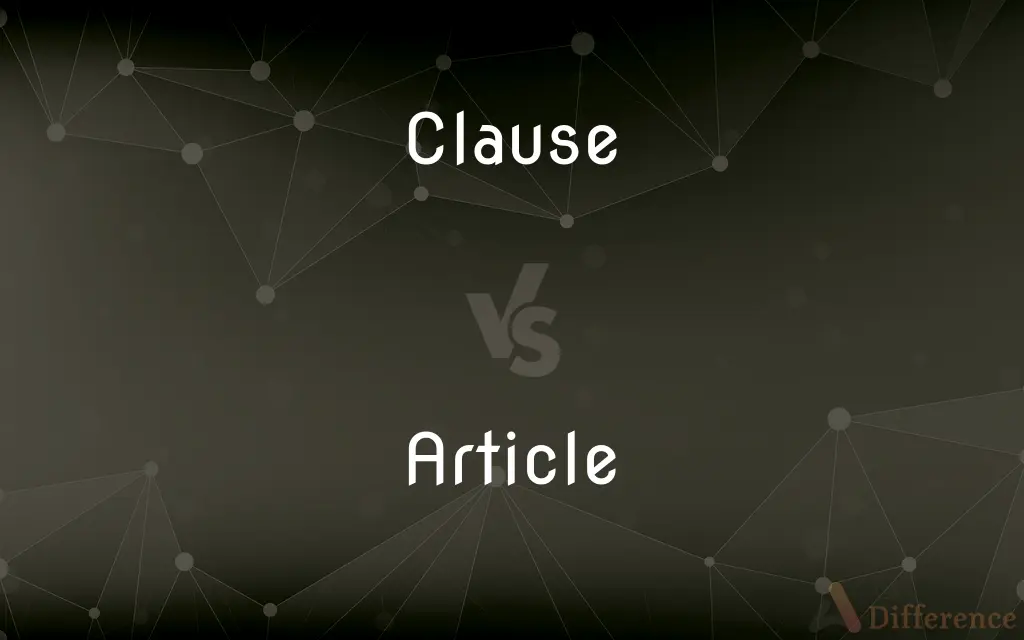Clause vs. Article — What's the Difference?

Difference Between Clause and Article
ADVERTISEMENT
Compare with Definitions
Clause
In language, a clause is a constituent that links a semantic predicand (expressed or not) and a semantic predicate. A typical clause consists of a subject and a syntactic predicate, the latter typically a verb phrase, a verb with any objects and other modifiers.
Article
A particular item or object
Small household articles
Articles of clothing
Clause
(Grammar) A group of words containing a subject and a predicate and forming part of a compound or complex sentence.
Article
A piece of writing included with others in a newspaper, magazine, or other publication
An article about middle-aged executives
Clause
A distinct article, stipulation, or provision in a document.
ADVERTISEMENT
Article
A separate clause or paragraph of a legal document or agreement, typically one outlining a single rule or regulation
It is an offence under Article 7 of the Treaty
Clause
(grammar) A verb, its necessary grammatical arguments, and any adjuncts affecting them.
Article
A period of training with a firm as a solicitor, architect, surveyor, or accountant
It may be worth taking articles in a specialized firm
He is already in articles
Clause
(grammar) A verb along with its subject and their modifiers. If a clause provides a complete thought on its own, then it is an independent (superordinate) clause; otherwise, it is (subordinate) dependent.
Article
The definite or indefinite article.
Clause
(legal) A separate part of a contract, a will or another legal document.
Article
Bind (a trainee solicitor, architect, surveyor, or accountant) to undergo a period of training with a firm in order to become qualified
He was articled to a firm of solicitors in York
Clause
To amend (a bill of lading or similar document).
Article
An individual thing or element of a class; a particular object or item
An article of clothing.
Articles of food.
Clause
A separate portion of a written paper, paragraph, or sentence; an article, stipulation, or proviso, in a legal document.
The usual attestation clause to a will.
Article
A particular section or item of a series in a written document, as in a contract, constitution, or treaty.
Clause
A subordinate portion or a subdivision of a sentence containing a subject and its predicate.
Article
A nonfictional literary composition that forms an independent part of a publication, as of a newspaper or magazine.
Clause
See Letters clause or Letters close, under Letter.
Article
The part of speech used to indicate nouns and to specify their application.
Clause
(grammar) an expression including a subject and predicate but not constituting a complete sentence
Article
Any of the words belonging to this part of speech. In English, the indefinite articles are a and an and the definite article is the.
Clause
A separate section of a legal document (as a statute or contract or will)
Article
A particular part or subject; a specific matter or point.
Article
To bind by articles set forth in a contract, such as one of apprenticeship.
Article
A piece of nonfictional writing such as a story, report, opinion piece, or entry in a newspaper, magazine, journal, dictionary, encyclopedia, etc.
Article
An object, a member of a group or class.
An article of clothing
A sales article
Article
(grammar) A part of speech that indicates, specifies and limits a noun (a, an, or the in English). In some languages the article may appear as an ending (e.g. definite article in Swedish) or there may be none (e.g. Russian, Pashto).
Article
A section of a legal document, bylaws, etc. or, in the plural, the entire document seen as a collection of these.
The Articles of War are a set of regulations...to govern the conduct of...military...forces
Article
A genuine article.
Article
A part or segment of something joined to other parts, or, in combination, forming a structured set.
Each of the chelicerae is composed of two articles, forming a powerful pincer.
Article
A person; an individual.
A shrewd article
Article
(archaic) A wench.
She's a prime article (whip slang), she's a devilish good piece, a hell of a goer.
Article
(dated) Subject matter; concern.
Article
(dated) A distinct part.
Article
(obsolete) A precise point in time; a moment.
Article
(transitive) To bind by articles of apprenticeship.
To article an apprentice to a mechanic
Article
(obsolete) To accuse or charge by an exhibition of articles or accusations.
Article
To formulate in articles; to set forth in distinct particulars.
Article
A distinct portion of an instrument, discourse, literary work, or any other writing, consisting of two or more particulars, or treating of various topics; as, an article in the Constitution. Hence: A clause in a contract, system of regulations, treaty, or the like; a term, condition, or stipulation in a contract; a concise statement; as, articles of agreement.
Article
A literary composition, forming an independent portion of a magazine, newspaper, or cyclopedia.
Article
Subject; matter; concern; distinct.
A very great revolution that happened in this article of good breeding.
This last article will hardly be believed.
Article
A distinct part.
The articles which compose the blood.
Article
A particular one of various things; as, an article of merchandise; salt is a necessary article.
They would fight not for articles of faith, but for articles of food.
Article
Precise point of time; moment.
This fatal news coming to Hick's Hall upon the article of my Lord Russell's trial, was said to have had no little influence on the jury and all the bench to his prejudice.
Article
One of the three words, a, an, the, used before nouns to limit or define their application. A (or an) is called the indefinite article, the the definite article.
Article
One of the segments of an articulated appendage.
Article
To formulate in articles; to set forth in distinct particulars.
If all his errors and follies were articled against him, the man would seem vicious and miserable.
Article
To accuse or charge by an exhibition of articles.
He shall be articled against in the high court of admiralty.
Article
To bind by articles of covenant or stipulation; as, to article an apprentice to a mechanic.
Article
To agree by articles; to stipulate; to bargain; to covenant.
Then he articled with her that he should go away when he pleased.
Article
Nonfictional prose forming an independent part of a publication
Article
One of a class of artifacts;
An article of clothing
Article
A separate section of a legal document (as a statute or contract or will)
Article
(grammar) a determiner that may indicate the specificity of reference of a noun phrase
Article
Bind by a contract; especially for a training period
Share Your Discovery

Previous Comparison
Repair vs. Mend
Next Comparison
Cynical vs. Jaded













































